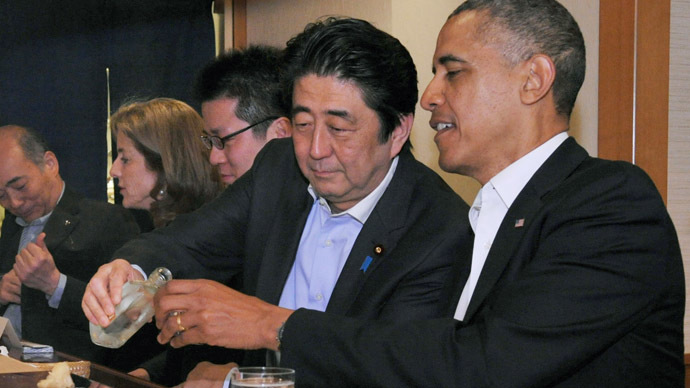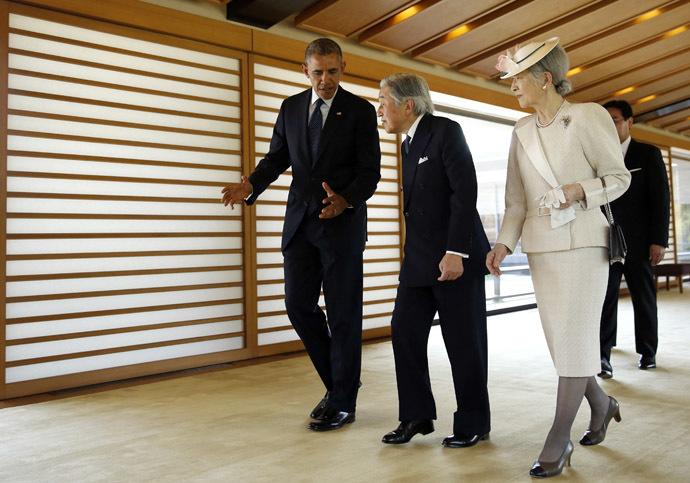Most important lesson for Japan from Obama’s trip: Improve ties with Russia

Japan needs to re-calibrate its foreign policy in double quick time. It should reduce its over eagerness to depend on the United States for tackling the gorilla in the room: China.
Japan can do this by cozying up to Russia and South Korea while redoubling its efforts and pace in further deepening ties with India.
This is the important fine print one can read in the President Barack Obama’s recently concluded visit to Japan, the first state visit by an American president to Japan in 18 years.
Japanese Prime Minister Shinzo Abe is a shrewd politician who has
the will and the capability to restore his country to its
pristine glory. He should separate the chaff from the wheat in
what Obama said and did not say during his trip to Tokyo.
Nothing bothers the Japanese political leadership more than the
question: how to deal with China? Japan can take a cue from India
in this context. India has been handling China much better than
any other country. The Indian mantra is this: engage with China
on all issues, including the contentious ones, while giving
fillip to bilateral trade and people-to-people contacts.
If political leaders and the people of Japan thought that Obama would say comforting words to Japan at the cost of China, and that the US alone is capable of safeguarding their interests vis-a-vis China, then they were mistaken. Nothing of the sort happened.
From the Japanese perspective, the core issue in Abe-Obama talks
was the Senkaku/Diaoyu islands dispute between Japan and China.
It must have been music to Japanese ears when Obama reaffirmed
his support for Japan over the disputed islands, and remarked
that the islands fell under a security treaty that commits the US
to act if Japan is attacked.
But wait! Obama did not come up with anything new here. And he
did not stop here. Sample his remarks that followed soon
thereafter.
"I've said directly to (Abe) that it would be a profound mistake to continue to see escalation around this issue rather than dialogue and confidence-building measures between Japan and China."
“In our discussions, I emphasized with Prime Minister Abe the importance of resolving this issue peacefully ... Not escalating the situation, keeping the rhetoric low, not taking provocative actions, and trying to determine how both Japan and China can work cooperatively together.”
Obama also called upon Japan and China to take “confidence-building measures” and significantly added: “We have strong relations with China.”

This should have punctured Japan’s ballooning hopes. Japan may well be justified in keeping up a brave front as is evident from this quote Chief Cabinet Secretary Yoshihide Suga made at a separate press conference after Abe-Obama talks: "Perhaps you should read his (Obama’s) comments more honestly. The president clearly said Article 5 of the Japan-U.S. Security Treaty applied to the islands. The comments are no more or no less than that."
But then in their heart of hearts they must be feeling that something is terribly amiss. The US security umbrella over Japan is losing its sheen with the rapid rise in China’s military and economic might. This trend is likely to accelerate in the coming years.
The moral of the story from Obama’s trip to Japan is as follows: America is a great friend of Japan but China too cannot be ignored and it is not a zero sum game.
Gone are the days when the US would take a maximalist position with a friend like Japan and a minimalist position with a strong competitor like China. These are the days of economic diplomacy. Gunboat diplomacy has been relegated to the fringe.
Therefore, against this backdrop, Japan needs to think out of the
box and explore newer foreign policy options.
Mending relations with Russia should now be a top priority for
Tokyo. In a way, Abe is already walking down this road. Abe paid
a visit to Moscow on 29-30 April, 2013, the first visit by a
Japanese premier to Russia in over a decade.
Indeed Abe has invested a lot of political capital in improving
ties with Russia since taking over in December 2012 and has met
Russian President Vladimir Putin five times.
It is a win-win situation for both Russia and Japan to get closer. Stung by the Western sanctions over Ukraine, Russia has already stated that it would be tapping new business and investment opportunities elsewhere, particularly Asia. Japan is a vast market for Russian oil and gas.
Japan should sew up as many trade pacts with Russia as soon as possible and strike a political deal with Russia over territorial disputes.
South Korea is a bit more difficult for Japan to handle,
considering the historical baggage. But if rough edges with
Russia are smoothened out, South Korea should be a doable
diplomatic mission for Japan to handle.
Japan’s relations with India are already free of any disputes. So
is the case between India and Russia and India and South Korea.
If Japan and Russia are able to forge closer bonds, it will be a
strategic game-changer in the Asian matrix.
The China factor will not be such a great worry for Japan then.
The writer is a New Delhi-based columnist and a strategic analyst who tweets @Kishkindha.
The statements, views and opinions expressed in this column are solely those of the author and do not necessarily represent those of RT.
The statements, views and opinions expressed in this column are solely those of the author and do not necessarily represent those of RT.













